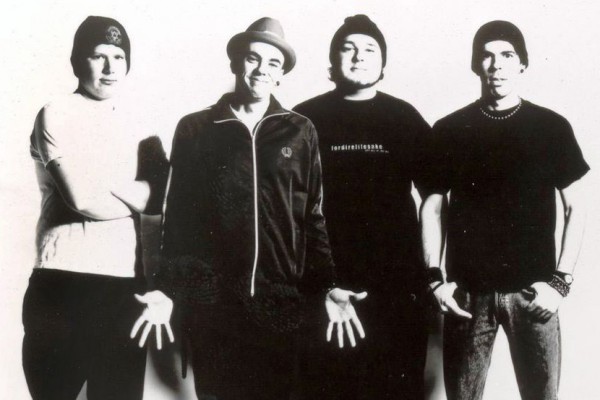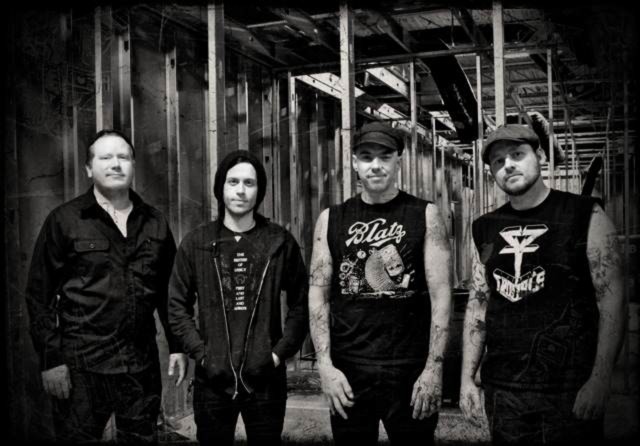SUICIDE MACHINES

Suicide Machines then...
Motor City punk: Jason Navarro interview
by Pete Crigler, with John Wisniewski
(August 2020)
Over the years, Jason Navarro has been one of punk's most dynamic front men. Currently leading Hellmouth and Break Anchor, Navarro slaved away for fifteen years as leader of Detroit's proudest, The Suicide Machines. Over six albums, two labels and multiple genre and lineup changes, The Machines blazed a path that any hardcore punk band should take pride in. Starting in 1996 with their debut, Destruction by Definition and leading up to 1998's Battle Hymns, the band were fearless in their attitude and their blistering spirit. Despite having called it quits in 2006, the band reunited a couple of years later with a reconfigured lineup and play shows here and there.
I exchanged questions with Mr. Navarro in November of 2013 (with a few updates in April 2020) and he opened my eyes to what was really going on behind the scenes.
ED NOTE: After scattered reunion shows in the last few years, Suicide Machines actually returned with a new album in March 2020, their first in 15 years, Revolution Spring, on Fat Wreck Chords.
PSF: When did you first become interested in music?
JN: Always curious 'bout it. My mom and aunt would have parties and be blaring MC5, the Nuge (Ted Nugent), Grand Funk, Black Sabbath and Led Zep, Stooges, and I was always listening. I discovered punk in '87/'88, and went to a show by my house (with) almost all locals except Bazooka Joe. That was what I loved, all the locals and wanted to be a part [of it]. As far back as I can remember though, Bon Scott from AC/DC was the guy who made me want to be a front man.
PSF: When did the Machines form and what was the scene in Detroit like at the time?
JN: 1990? Or 91? Scene was still pretty violent, lotsa Nazi skins, bike gangs goin' to the shows. Why? I don't know. Beat up punks I guess. There was a homeless shelter in the Cass Corridor (West end of downtown Detroit) called the 404 with lotsa great shows there. Had to carry a knife usually.
PSF: How long was it afterwards that the lineup stabilized?
JN: Line up wasn't really stable 'til after the first tour in '94 maybe. Royce [Nunley] was our bassist right after that. Lotsa drummers and bassists before him.
PSF: What was it like signing with Hollywood Records and what do you think about it now?
JN: Was exciting, man! We were just like DIY basement punks and had been approached by other majors but didn't really go anywhere on either end- we didn't like them, they didn't like us. We accepted Hollywood's offer to fly to L.A. and demo, figuring we would never be signed and we would get a great recording for a 7". Studio was insane compared to where we had recorded before. Overwhelming really- just the gear and boards in all the rooms, which were massive, not so much who recorded there. I remember a dude saying U2 recorded Rattle and Hum in this room. I believe I said 'so fucking what?' back to him.
PSF: What was success like and how did everyone deal with it?
JN: Success? Well, I don't know how successful we were but I hated people trying to leave demos on my porch and shit. Derek [Grant, 3rd drummer] quit the band cuz he didn't want to be in photos or videos. If you watch the "SOS" video, it's our friend Brooks [Wackerman] from Bad Religion on the drums cuz Derek refused to do a video. He didn't want to be in magazines and stress was causing rifts between all of us with him because of it. Dan [Lukacinsky, guitarist] and him were really not getting along. Being in the public eye, especially at home, wasn't helping.
PSF: What was the main songwriting influence in the band?
JN: Just people and the city around us.
PSF: What was the inspiration for recording Battle Hymns, one of the hardest, fastest records ever released on a major label?
JN: Well, for starters, we were not ready to record- only had a month to write it. We booked the studio but just kept accepting these great tours like the Descendents and No Doubt just kept coming. I dunno, I wrote a lotta that record. I have always been into aggressive music, just finally showed up in the Machines. Hahahaha. It's pretty fast and post for a major.
PSF: What was it like when Derek left?
JN: He's my brother. It was really fucking hard.
PSF: When did the band leave Hollywood and sign with SideOneDummy?
JN: We had had enough with the major and were supposed to be tied up for 3 more records. They were nice enuff or thought 'this band is a has been,' so (they) let us go. SideOne Joe's (Sib) was an old friend, and had been trying to put out a record for us for a long time, so it made perfect sense.
PSF: When did Royce Nunley [bassist] leave and how did the new lineup work out?
JN: Actually, Royce was the one who got us into a sticky legal mess, getting us to fire our manager, then quit mid problems, leaving me with a mess to clean up. He and Dan were really at each other's throats- had to be broken up a few times due to near fist fights. I was more than happy to have Rich [Tschiraht] in the band- he is one of Detroit's best bass players hands down, tasteful as fuck! And Ryan [Vanderberghe] and him were the most solid rhythm section we ever had.
PSF: What happened with the breakup- was it unexpected or planned?
JN: Nah, very unexpected. We had decided we would stay together but stay home and work, and not tour much. After a tour of Mexico and Australia with Pennywise, we were stopping touring 8 months outta the year. Then there was L.A. at the Troubadour and lotsa problems. Ended in a really stupid blowup between Dan and I.
PSF: Do you still keep in touch with Dan?
JN: I have tried. He won't talk to me. I had a reunion tour in the works, both line ups, doing 2 sets, even Royce was in to make peace. Dan wouldn't reply to me 'bout anything. I invited him to fly this Xmas to play Black Christmas [festival]. No reply
PSF: How did Hellmouth come together and what has that experience been like?
JN: I had been writing crust songs for a project with me and Danny [Lore, bassist/singer] from Against All Authority. He just lived too far away. So rounded up some friends here. Did not think it would ever had gotten so much attention 'cuz it's so gnarly. I just didn't think people would think much (about it). Gravestone Skylines is prolly the best record I have ever been a part of in my life.
PSF: Are there any future plans for the Machines?
JN: No plans, sorry. Just working on Break Anchor these days.
PSF: What do you hope the band's legacy will be?
JN: Legacy? Weird. I don't know. I just want Destruction by Def(inition) to be a punk record people will listen to for generations to come.

Suicide Machines now
April 2020 update:
PSF: When did the band decide it was time to make a new Suicide Machines album?
JN: Just a bit less than two years ago.
PSF: How did you hook up with producer Roger Lima and Fat Mike [of Fat Wreck Chords]?
JN: Well, I had talked with Mike and he was pretty down so we sent song demos to him and Erin [Burkett, label co-founder] to play for everyone. Mike was pretty happy it didn't suck and Erin was digging too so we moved forward. And Roger is a super old close friend of mine. We met on Less than Jake's first tour and have been down since. I knew we had good music, I just really wanted someone who knew us as a band and what we wanted and what he thought was good for us. Especially pushing me in the vocal booth. If anyone knows the Machines, it's him. And Mike really wants him to produce more Fat Wreck albums. All made sense.
PSF: Were there any underlying themes you were pursuing in your songwriting for the new album?
JN: Yeah, I was really looking at who I am at 46 years old and what turned me into who I am as a human. I was also feeling very much like my outlook on the world is slowly moving to a hopeful one. No false hope, just hope in myself and how I can affect the city around me.